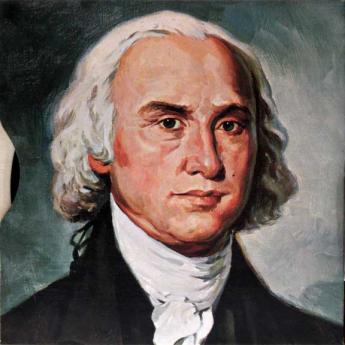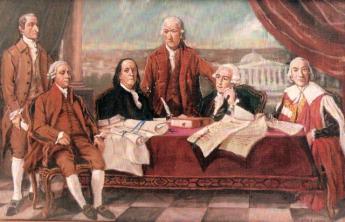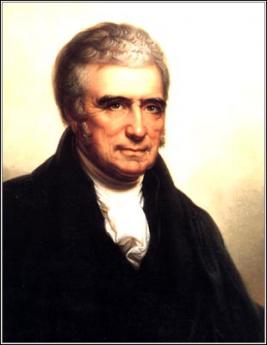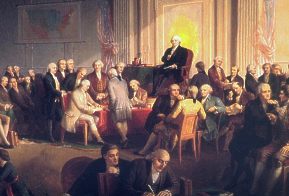Related Topics
Philadelphia Legal Scene
The American legal profession grew up in this town, creating institutions and traditions that set the style for everyone else. Boston, New York and Washington have lots of influential lawyers, but Philadelphia shapes the legal profession.
..The Constitution
Our Constitution was not a proclamation written by a convention. It was a negotiated contract for uniting thirteen sovereign independent states. Nothing like that had ever been done voluntarily, and few nations have matched it in two hundred years, even with the use of force.
Federalism Slowly Conquers the States
Thirteen sovereign colonies voluntarily combined their power for the common good. But for two hundred years, the new federal government kept taking more power for itself.
...Potential New Constitutional Amendments
New topic 2012-08-01 18:50:35 description
Lumpers, Splitters and Technicians: The Framers of the American Constitution
 Half a dozen distinguished colonists came to believe the thirteen American colonies could not survive unless they banded together. Eight years of bitter experiences during the Revolutionary War had taught them they must unite. We might call them lumpers.
Half a dozen distinguished colonists came to believe the thirteen American colonies could not survive unless they banded together. Eight years of bitter experiences during the Revolutionary War had taught them they must unite. We might call them lumpers.
IF ALL MEN WERE ANGELS, NO CONSTITUTION WOULD BE NECESSARY

|
| James Madison |
JAMES Madison, Washington's floor manager at the Constitutional Convention of 1787 in Philadelphia, stated the main necessity for holding the Convention at all arose from selfish and untrustworthy human nature. The assembly probably understood exactly who he had in mind, although that is a little unfair to residents of Virginia. He really meant everybody. In the theology of the time, mankind was stained with original sin. Particularly in France, many 18th century romanticists responded to the Enlightenment by defiantly declaring human nature is born pure in heart. In their view, current evils grow from the pollution of civilization, without which it might be possible to have no government at all. At its root, such romanticism was an outcry against progress and civilization, blaming the world's troubles on the Industrial Revolution, so to speak. From Madison's skeptical viewpoint, the most awkward feature of the Romantic Period was its adoption by his Francophile friend and neighbor, Thomas Jefferson, the current American ambassador to France. Madison recognized that Jefferson and Patrick Henry were prepared to assail any attempt to add the slightest power to a central government, particularly if it weakened the power of Virginia. As indeed they promptly came forward to do and nearly succeeded.

|
| Treaty of Paris |
After fighting an eight-year war for freedom, American belief was wide-spread that it was time to draw back from such anarchy. But there was widespread suspicion in every other direction, too. England seemed to concede, not defeat but only current military overstretch, possibly displaying reluctance to see its former colonies with full sovereignty. George III might wait for America to weaken itself and then try to take them back. Britain almost couldn't do anything right; it was also possibly up to no good when the Treaty of Paris astonishingly conceded land to the Mississippi instead of stopping at the Appalachians. Even our ally France nursed regrets for its somewhat older concessions after the French and Indian War. If even the two mightiest nations of Europe could not maintain order in the vast North American wilderness, perhaps they felt the inexperienced colonies would soon collapse from the effort. Further intra-European wars seemed likely, and could soon spread from Europe to the Western hemisphere. The guillotine was bad enough, Bonaparte would be worse. Our governance as a league of states was in fact, only a league of armies. The Articles of Confederation would not quell inter-state rivalries in peacetime, as only four years (1783-87) experience after the Treaty of Paris were clearly foreshadowing. It was time we listened to Benjamin Franklin, who had been arguing since the Albany Conference of 1745 for unification of the colonies, and to Robert Morris who had been arguing for a written constitution since 1776, a bicameral legislature since 1781, government by professional departments instead of congressional committees, and the ability to levy national taxes -- since at least 1778. Professor Witherspoon of Princeton had provided some ideas about how to make these proposals self-enforcing, Washington was firmly behind a Republican system and opposed to a monarchy. On the other hand, everyone knew that under the Articles of Confederation the thirteen States had often refused to pay their share, abused their ability to deal independently with foreigners, dealt unfairly with their neighbors, and capriciously mistreated their own citizens. It was time to act boldly. With a blue-ribbon convention of national heroes behind these simple ideas, surely it would be possible to convince the sovereign state legislatures to dethrone themselves.

|
| John Marshall |
Two men quietly applied even deeper thinking than that; Benjamin Franklin of Pennsylvania, and John Marshall of Virginia. Both of them had served in state legislatures, both were dismayed by the experience. Franklin also had a long period of close-up observation of the British Parliament, suffering personal abuse there, and had reason to reflect on the earlier abuses by that Parliament under Cromwell during the English Civil War. Certain bad tendencies seemed universal in legislative bodies. Although John Marshall was not a member of the Virginia Constitutional delegation in 1787, he was active in the politics of the group it represented back home. Both Marshall and Franklin had reason to be uneasy about misbehavior in representative bodies, whether called legislatures, congresses, or parliaments. When people said states misbehaved under the Confederation arrangement, they really meant legislatures misbehaved. Franklin did what he could within the Convention to curb this observed behavior by enumerating limited powers and endorsing power balanced against power. When he had nudged it as far as he could, he wearily agreed to give the product a try. Franklin did not trust Utopias, but he had lived among Quakers for years, observing one Utopian society which seemed to endure without resorting to tyranny.
The Constitutional provisions in Article I, Section X became the heart of what the 1787 Convention wanted to change about the relationship of the national and state governments.
States are forbidden to ...
"emit bills of credit, make anything but gold or silver a legal tender in payment of debts, pass any bill of attainder, ex post facto law, or law impairing the obligation of contracts."

|
| 1787 Convention |
This brief clause is almost a presentment of what state legislatures were doing, which serious patriots regarded as wholly unacceptable. Failure of states to abide by the terms of international treaties must be included in such a summary, although the new Constitution went beyond the powers of states by locating treaties beyond the power of even Congress to change, once ratified. Some observers in fact feel that within the First Article clause, protecting the sanctity of contracts was really the nut of the matter. In one way or another, most states seemed to resort to paying their debts with inflation, somehow failing to recognize that borrowing never pays debts, it only postpones them. The great bulk of this new nation's business was to be conducted as voluntary agreements between two contracting parties. The State -- and the states -- were to stay out of the private sector, except as referee, to see that both sides kept their agreements. As a footnote, the matter of government intervention in private affairs was to rise again in the behavior of the Executive branch in the 1937 Court Packing uproar, and in the 2009 health insurance legislation. Some critics, therefore, have discomfort that the heaviest Constitutional weight was placed by the Founding Fathers on protecting private property. Are not other issues more important, they ask, like life, liberty and the pursuit of happiness? The Founders, of course, we're here not ranking benevolences by value; they were stating principal urgencies for convening the meeting. In a strange unintended way, they here stumbled on the right to property as the foundation for all other rights. But John Marshall understood it was true and was to spend thirty years hammering it into place. People broke individual promises by defaulting on debts; they simply did the same as governments, using inflation.
Originally published: Thursday, November 06, 1997; most-recently modified: Thursday, July 25, 2019